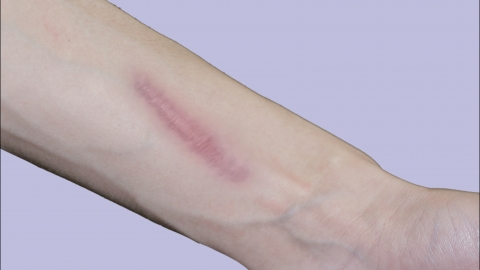Why does a scar itch after it has healed?
Generally, itching after wound healing may be related to factors such as nerve ending regeneration, skin barrier repair, eczema, neurodermatitis, and keloids. It is recommended to seek timely medical attention, identify the underlying cause, and undergo symptomatic treatment under the guidance of a qualified physician. Detailed explanations are as follows:

1. Nerve Ending Regeneration
Damaged nerve endings gradually regenerate during the wound healing process. Newly formed nerve endings are particularly sensitive to changes in the surrounding environment, especially stimuli such as temperature, humidity, and touch, which may trigger itching. It is recommended to avoid excessive friction and stimulation, which can help reduce abnormal sensitivity of the nerve endings and alleviate the itching sensation.
2. Skin Barrier Repair
Scar formation is part of the skin's barrier function repair process following damage. During this repair process, the integrity of the skin barrier gradually recovers, but it may also lead to localized sensory abnormalities, including itching. It is recommended to use mild moisturizing products, which can help maintain the integrity of the skin barrier and reduce the sensation of itching.
3. Eczema
Eczema is usually caused by environmental and immune-related factors. Patients with eczema have impaired skin barrier function, making them more susceptible to external irritants, leading to increased release of inflammatory mediators and resulting in itching. It is typically accompanied by symptoms such as skin erythema, papules, and vesicles. Treatment should follow medical advice and may include topical medications such as desonide cream, fexofenadine hydrochloride tablets, erythromycin ointment, and others.
4. Neurodermatitis
Neurodermatitis is typically associated with neurological factors. Emotional fluctuations, anxiety, stress, and other neurological factors can cause abnormal function of skin nerve endings, leading to excessive release of neurotransmitters and resulting in itching. It is generally accompanied by symptoms such as lichenification, thickening, and roughness of the skin. Treatment should follow medical advice and may include medications such as loratadine tablets, cetirizine hydrochloride tablets, and ephedrine hydrochloride capsules.
5. Keloids
Keloids are usually associated with skin injuries. Fibrous tissue proliferation within keloids can compress surrounding blood vessels and nerves, leading to poor local circulation and abnormal nerve ending function, which causes itching. Symptoms such as skin induration, elevation, and smooth surface may also occur. Treatment should follow medical advice and may include topical medications such as heparin sodium cream, vitamin E soft capsules, and asiaticoside tablets.
In daily life, it is important to clean the wound regularly, keep the wound clean and dry, and avoid using irritating cleansing products, which can help reduce the occurrence of infection and inflammation.




